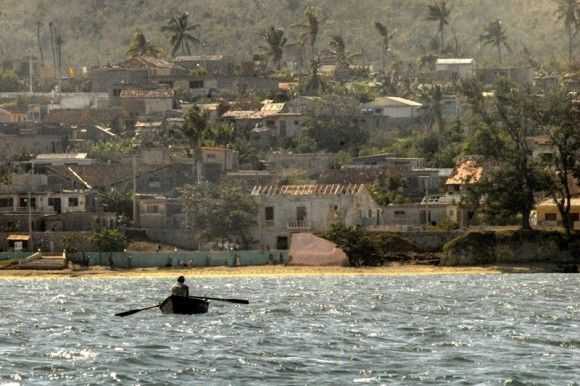It’s a bar, a restaurant, a watering hole for ex-pat Canadians and tourist, across from one of Holguin’s scenic town plazas. The languages: German, French, heavily accented English, and a smattering of Russian blend with the constant din of staccato Spanish. After all, this is Cuba.
My new friend Fernando is recounting yesterday’s fishing trip off the coast, near the village of Gibara, a half-hour north. His enthusiastic narration requires both hands waving, describing the action.
I’m listening, but my focus is on an elderly lady sweeping the floor. The ceiling of this open-air establishment is a latticework of wooden beams interlaced with vines, casting the room in spotty shade. Tulip shaped purple flowers adorns the vines and with each swirl of breeze, a few break off and drift lazily to the floor—a house of falling flowers.
Fernando is down from Miami. Allowed under the Obama administrations unlimited family visits policy, these trips re-unite him with his Cuban cousins and fills their freezers with fish.
“We brought home over seventy-five snapper and grouper,” he brags. “Enough to feed the family and their neighbors till I come back in three months.”
Despite the rich fishing grounds off the north coast, high prices make a steady diet of seafood unattainable for city dwellers, the cost of fuel for the trip is beyond most peoples limited budgets.
“I brought my cousin a new Penn rod and reel, along with spools of line and boxes of hooks,” the Cuban American explains. “But when the action got hot, he set the rod aside and used his more familiar hand line (Cuban Yo-Yo)—said it was faster”.
Tomorrow, I’ll embark on a similar mission to the coast. Another Cuban-American friend’s grandmother is suffering from high cholesterol and with medicine unavailable needs a diet of fish.
According to Fernando this should pose “no problem.” In addition to the outstanding bottom fishing, dolphin, wahoo and tuna fall runs are in full swing.
“There are plenty of fishermen willing to take you.” He adds. “The government doesn’t watch them so close any more.” Time was, a journey in a small boat was impossible but for a trusted few. Now, to many like Fernando and his cousins, day excursions are allowed.
For the time being, I’m content to sit and listen to these happy fishermen recount yesterday’s adventures, bragging, poking fun, talking about who lost the big one. Like fisherman’s stories everywhere, the fish grow exponentially in size with each round of beers.
Among the din of international voices another purple flower drifts silently to the floor. The woman, at the end of her sweeping run, turns, and begins again. Her job secure—as long as the flowers fall.
Next month: Gibara, where Columbus first glimpsed Cuba.
Outdoor writer and author of “97 Miles South,” Phil Thompson has fished and dived the waters of Cuba for two decades Contact him at: www.captphilthompson.com
[easy-social-share]
